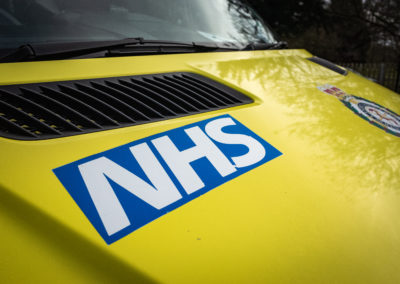‘Consultant Connect’s rota system has really helped. Our average answer time has now reduced considerably to 16 seconds, proving there is always senior specialist input early in a patient’s care.’
Prof-to-Prof Advice via Consultant Connect launched in NHS Lanarkshire in 2020, connecting healthcare professionals to specialists via telephone. In July 2024, the Acute Paediatrics line was added to the service, providing primary and emergency care users with a single point of access for urgent specialist paediatric input. The introduction of the Acute Paediatrics line led to the overall usage of Consultant Connect in Lanarkshire tripling, therefore ensuring patients are treated in the right place for their care the first time. We spoke with Dr David Beattie, the Acute Paediatrics Consultant who helped set up the line, to find out what the catalyst for change was:
Acute Paediatrics stats*:
More than 2,400 calls answered | 90% first-time connection rate | Calls are answered within 16 seconds on average | Calls last three minutes on average
What obstacles did you face before adding the Acute Paediatrics line to Consultant Connect?
‘The biggest challenge in our department was that the bleep system was very busy – our calls all come from different sources: GPs, emergency care doctors, community midwives, health visitors, and they would call the hospital switchboard, who would then phone us and explain who was on the line and transfer the call. It was a laborious process, which quite often led to a backlog of calls waiting on the line. The consultant who manages the acute admissions ward was also the specialist who held the bleep, and it was difficult to juggle both responsibilities while attending to patients.
‘Additionally, we almost always found that at least one of the callers would hang up whilst waiting in the queue, understandably because they were sometimes waiting for a long period of time. If clinicians can’t get through to us for timely advice, they tend to send their patients to the children’s ward if this has been their intention and reason for speaking with us. This led to further challenges for us because unannounced children turned up who we didn’t know to expect. A substantial number of the bleeps we received resulted in no need for the patient to be sent in for review, and other options were more appropriate, for example, an outpatient clinic appointment or advice to manage at home with a discussed plan. But because not all those bleep conversations always took place, children were coming to the ward unnecessarily and waiting a long time to be seen, just to be discharged immediately after review by our medical staff.’
How has routing the Acute Paediatrics service through Consultant Connect helped solve this obstacle?
‘Consultant Connect’s rota system has really helped. We still have the same consultant taking the calls, but we have also implemented a second backup line, which is answered by a registrar. Suppose the consultant is already engaged on the phone or undertaking responsibilities on the ward that can’t be interrupted, instead of the caller needing to call back later or be diverted to voicemail. In that case, their query can be answered by the registrar. Our average answer time has now reduced considerably to 16 seconds, proving there is always senior specialist input early in a patient’s care.
‘We’re led by the call data, so from 9am – 5pm, which is our busiest period, the service is consultant-led with the registrar available as back-up, and from 5pm – 9am, which tends to be less busy, the service is handled by the registrar.
‘Our clinical colleagues are really pleased with the service. We don’t need to wait for switchboard to action the call; instead, the middleman is eliminated completely from our end. It proves that we’re speaking to primary care and A&E sooner, and therefore reducing the number of patients who are unnecessarily conveyed to hospital.’
How do you job plan this service?
‘We have always maintained that our bleep was busy, but it’s the NHS; everyone is busy, and it was difficult to demonstrate that objectively. We wanted to prove the busyness and have evidence of interactions. All calls made via Consultant Connect are tracked and recorded, with automatic data capture, making it easier to show quantifiable evidence of how in demand we are.
‘Finances are stretched across all the NHS, so any additional staff or change in job plan has to be densely proven, so the data that Consultant Connect captures has already been useful in facilitating meetings with management so that we can discuss the volume of calls received. Our service is the busiest phone in NHS Lanarkshire, and the data proves that. Applications have been submitted to fund additional nursing staff to answer open-access calls regarding recently discharged patients or those with chronic conditions. Although we don’t know if this application has been successful yet, the Consultant Connect data will aid this through the breakdown of calls and whether those calls could be triaged by nursing staff.’
Have you needed to listen back to any of your call recordings?
‘Upon set-up of this line, we agreed that the only time we would access any recordings of calls answered is if a patient complaint was made or a significant adverse event took place, which is when a patient came to or could potentially have come to serious harm or death. Thankfully, a scenario has not happened in which we have needed to listen back to these recordings as yes, but it is inevitable in time. Still, it’s reassuring to know they are available if there were any questions about how a patient came to the team’s attention or how the case was handled.’
* Data correct as of October 2024
View and download a PDF version of this case study.
If you have any questions or would like to find out more, email hello@consultantconnect.org.uk or call us on 01865 261 467.




